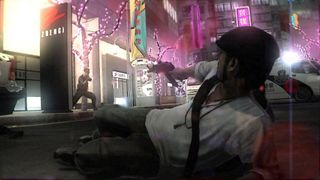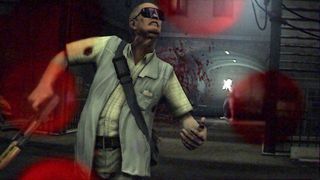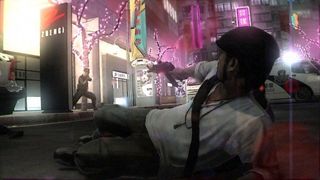
Honour among thieves? Kane & Lynch 2's multiplayer doesn't seem to have heard of it, judging by the number of double-crossing, turncoat, backstabbing, dirty rat bastards who make up the rest of your criminal team. And those that haven't betrayed you yet – well, they're thinking of it. You might as well deal with them someplace quiet and pocket their loot. Hey, a guy's gotta make a living, right?

Such is the guiding morality behind the third-person shooter's Fragile Alliance mode, which sees players take on the roles of armed robbers conducting bloody heists. Work together to secure the swag, and then fight your way out through the amassing police force to an escape vehicle. Everyone who makes it gets an equal cut of the profits. But turn traitor by killing a fellow crim, and you go it alone, securing your plunder as yours alone. Your teammates might not be best pleased, of course, and the only way they can take your cut back is to prise it from your cold dead hands.
It's a multiplayer mode inherited from the previous game, but the sequel brings a good number of refinements to bolster the essential risk-reward tension. No one can kill anyone else until looting has begun, for example; traitors are clearly labeled as such; and some degree of cooperation is essential if you are to reach the vehicle at all. Cleverly, the reliability of players is tracked over successive games and made public in the lobby before each round – so you know when not to turn your back.

Also key to this is the idea that players are always given a second chance. In a game about betrayal, it's important to be able to rebuff an unexpected attack, otherwise the entire team could be wiped out in the half-second it takes for one greedy douchebag to spray bullets into their backs. However, Dog Days has perhaps visited the other extreme – it takes ages to kill someone. Two entire clips can be fired into them before they go down, and even then, they can recover almost instantly and get back onto their feet, sliding off into cover while you're reloading. You can switch to your sidearm to finish them off – but it feels unnatural that this should be the default tactic, while getting the jump on your opponent offers little advantage.
Though you can buy better weapons with the previous round's ill-gotten gains, guns are initially inaccurate and kick wildly. Frustrating though this is, it does force everyone into cooperation – you need to flank dug-in enemies rather than pick them off from afar.

Similarly, to prevent players from racking up instant kills, there's no melee attack. Players can take each other as a human shield, however, with the sole option of throwing them to the ground. The implementation of this is extremely messy at present, with players clipping through each other in a bizarre dance of fragmented animation cycles.
Such things are no doubt to be modified before launch – and there is much balancing to do besides. Police dogs which instantly kill you are an easy fix, but there are more subtle quirks to the game which lead to erratic scoring – at least at low level play. Die as a criminal, and you become a cop, but you can still take loot from the enemy and share it among your law enforcement buddies. This sometimes leads to even more peculiar situations: if you've managed to bag very little loot as a criminal, for example, it may be preferable to die, respawn as a cop and get a cut from the fuzz. In fact, it seems easier to make money as a cop altogether – you don't have to escape and you don't have to worry about betrayal from your teammates.
The biggest gaming news, reviews and hardware deals
Keep up to date with the most important stories and the best deals, as picked by the PC Gamer team.

In an alternative game mode, called Undercover Cop, one of the criminals is obliged to take down the rest of the gang before they escape, without killing any cops or civilians – but even if the bad guys make off in the vehicle, he still pockets whatever cash he's swept up along the way. Paranoia distorts things to create a giddy tension – the undercover agent does not get labeled as a traitor when he picks off the robbers, and so players nervously scrutinise each other, to see who's hanging back and not firing at the cops. Yet, combined with the normal stresses of the game, this divided attention can prove lethal. In our playthrough, three successive rounds passed in which only one person tables a single dollar – usually the undercover cop.

In a game mode such as this, there are many subtle strategies and so much relies on your companion's knowledge of them that it's difficult to judge how well it will bed down. When the game gets out in the wild, players won't have the benefit of an exasperated game director standing behind them telling them to work together more. Nonetheless, it's a welcome departure from by-numbers multiplayer padding, and its interplay between team-players and traitors promises to work brilliantly among close but competitive crews.
- Release: August 27
- Publisher: Eidos
- Developer: IO Interactive
- Link: KaneAndLynch.com
Martin Davies
PC Gamer is the global authority on PC games—starting in 1993 with the magazine, and then in 2010 with this website you're currently reading. We have writers across the US, Canada, UK and Australia, who you can read about here.
Most Popular


